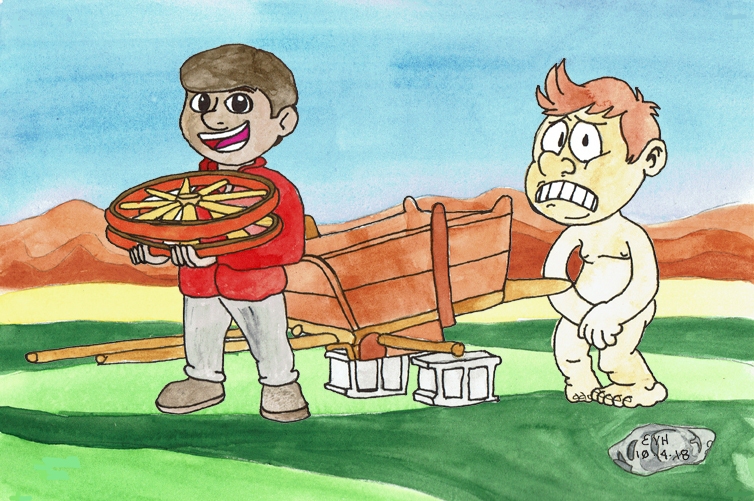
Jataka 90
Akataññu Jātaka
Ungrateful
as told by Eric Van Horn
originally translated by Robert Chalmers, B.A., of Oriel College, Oxford University
originally edited by Professor Edward Byles Cowell, Cambridge University
The intended message in this story is about being grateful. Gratitude, as Ṭhānissaro Bhikkhu says, is the basis for the whole practice. It is only with gratitude that you can practice generosity. If you are grateful, you will have a feeling of sufficiency, and when you feel sufficient – that you have enough – then you are happy to share. And likewise, generosity is the basic for virtue, meditative absorption, and wisdom.
Stories like this have to be treated with some care. It may sound a little tit for tat. Sometimes people think, well, so-and-so did something bad to me, and it is their karma that I then do something bad to them. That is definitely not what the Buddha taught. One of the factors of the karmic result of an action is your motivation. So unless your motivation is wholesome, the karmic result will be unwholesome.
“The ungrateful man.” This story was told by the Master while at Jetavana. It is about Anāthapiṇḍika.
On the borders, so the tale goes, there lived a merchant. He was a correspondent and a friend of Anāthapiṇḍika’s. However, they had never met. There came a time when this merchant loaded 500 carts with local produce and gave orders to the men in charge to go to the great merchant Anāthapiṇḍika. There they were instructed to negotiate a trade for the merchandise in his correspondent’s shop for a fair value and bring back the goods that they received in exchange.
So they went to Sāvatthi and found Anāthapiṇḍika. First they gave him a gift, and then they told him their business.
“You are welcome,” said the great man, and he ordered that they be lodged there and provided with money for their needs. After kind inquiries into their master’s health, he bartered for their merchandise and gave them the goods in exchange. Then they went back to their own district and reported what had happened.
Shortly afterwards, Anāthapiṇḍika similarly sent 500 carts with merchandise to the very district in which they lived. And his people, when they had got there, went to call upon the border merchant with a gift in their hands.
“Where do you come from?” he said.
“From Sāvatthi,” they replied, “from your correspondent, Anāthapiṇḍika.”
“Anyone can call himself Anāthapiṇḍika,” he said with a sneer. And taking their gift, he sent them away. He did not give them any lodging or money. So they bartered their goods for themselves and brought back the wares in exchange to Sāvatthi, along with the story of the reception they got.
Now it so happened that this border merchant sent another caravan of 500 carts to Sāvatthi. As before, his people went with a present in their hands to wait upon Anāthapiṇḍika. But, as soon as Anāthapiṇḍika’s people saw them, they said, “We’ll see, sir, that they are properly lodged, fed, and supplied with money for their needs.” And they took the strangers outside the city and told them to unyoke their carts at a suitable spot, telling them that rice and a money would come from Anāthapiṇḍika’s house.
At the middle watch of the night, they assembled a band of male servants and slaves and looted the whole caravan. They took every piece of clothing that the men had and drove away their oxen. They took the wheels off the carts, leaving the carts but taking the wheels. Without so much as a shirt among the lot of them, the terrified strangers ran away and managed to reach their home on the border. Then Anāthapiṇḍika’s people told him the whole story. “This excellent story,” he said, “will be my gift to the Master today.” And off he went and told it to the Master.
“This is not the first time,” the Master said, “that this border merchant has acted in this way. He was the same in days gone by.” Then, at Anāthapiṇḍika’s request, he told the following story of the past.
Once upon a time when Brahmadatta was reigning in Benares, the Bodhisatta was a very wealthy merchant in that city. And he, too, had a correspondent border merchant who he had never seen. And everything came to pass as told above.
Being told by his people what they had done, he said, “This trouble is the result of their ingratitude for the kindness that was shown to them.” And he went on to instruct the assembled crowd in this stanza:
The man ungrateful for a kind deed,
Shall find no helper when in need.

Figure: The Price of Ingratitude
In this way the Bodhisatta taught the Dharma in this stanza. And after a life spent in charity and other good works, he passed away to fare according to his karma.
His lesson ended, the Master identified the birth by saying, “The border merchant of today was the border merchant of those days as well, and I was the merchant of Benares.”
